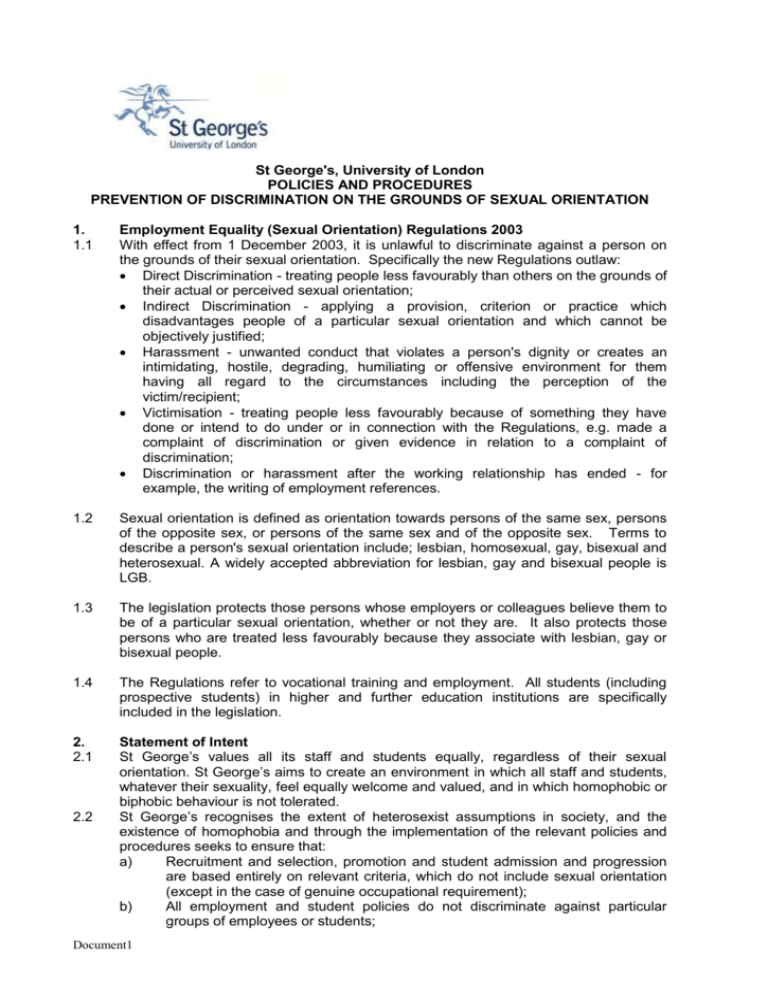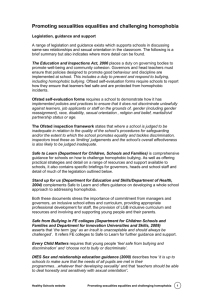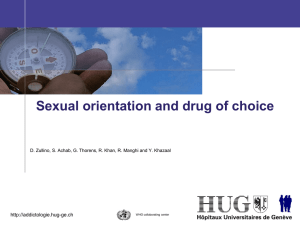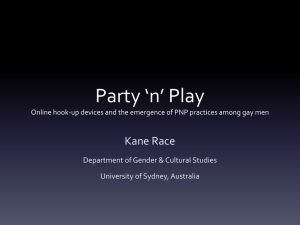Sexual Orientation Policy - St George`s, University of London
advertisement

St George's, University of London
POLICIES AND PROCEDURES
PREVENTION OF DISCRIMINATION ON THE GROUNDS OF SEXUAL ORIENTATION
1.
1.1
Employment Equality (Sexual Orientation) Regulations 2003
With effect from 1 December 2003, it is unlawful to discriminate against a person on
the grounds of their sexual orientation. Specifically the new Regulations outlaw:
Direct Discrimination - treating people less favourably than others on the grounds of
their actual or perceived sexual orientation;
Indirect Discrimination - applying a provision, criterion or practice which
disadvantages people of a particular sexual orientation and which cannot be
objectively justified;
Harassment - unwanted conduct that violates a person's dignity or creates an
intimidating, hostile, degrading, humiliating or offensive environment for them
having all regard to the circumstances including the perception of the
victim/recipient;
Victimisation - treating people less favourably because of something they have
done or intend to do under or in connection with the Regulations, e.g. made a
complaint of discrimination or given evidence in relation to a complaint of
discrimination;
Discrimination or harassment after the working relationship has ended - for
example, the writing of employment references.
1.2
Sexual orientation is defined as orientation towards persons of the same sex, persons
of the opposite sex, or persons of the same sex and of the opposite sex. Terms to
describe a person's sexual orientation include; lesbian, homosexual, gay, bisexual and
heterosexual. A widely accepted abbreviation for lesbian, gay and bisexual people is
LGB.
1.3
The legislation protects those persons whose employers or colleagues believe them to
be of a particular sexual orientation, whether or not they are. It also protects those
persons who are treated less favourably because they associate with lesbian, gay or
bisexual people.
1.4
The Regulations refer to vocational training and employment. All students (including
prospective students) in higher and further education institutions are specifically
included in the legislation.
2.
2.1
Statement of Intent
St George’s values all its staff and students equally, regardless of their sexual
orientation. St George’s aims to create an environment in which all staff and students,
whatever their sexuality, feel equally welcome and valued, and in which homophobic or
biphobic behaviour is not tolerated.
St George’s recognises the extent of heterosexist assumptions in society, and the
existence of homophobia and through the implementation of the relevant policies and
procedures seeks to ensure that:
a)
Recruitment and selection, promotion and student admission and progression
are based entirely on relevant criteria, which do not include sexual orientation
(except in the case of genuine occupational requirement);
b)
All employment and student policies do not discriminate against particular
groups of employees or students;
2.2
Document1
c)
d)
e)
f)
g)
h)
i)
j)
Everyone is treated with equal dignity and fairness regardless of their sexual
orientation;
Homophobic or biphobic abuse, harassment or bullying (for example, namecalling, derogatory jokes, lyrics of songs, unacceptable or unwanted behaviour,
intrusive questions) is a serious disciplinary offence, and will be dealt with
under the appropriate procedure;
Homophobic or biphobic propaganda, in the forms of written materials, graffiti,
songs or speeches will not be tolerated. St George’s will remove any such
propaganda whenever it appears on the premises and to take action against
those responsible;
St George’s will provide a supportive environment for staff or students who wish
it to be known that they are LGB. However, it is the right of the individual to
choose whether they wish to be open about their sexuality. To 'out' someone,
whether staff or student, without their permission is a form of harassment, and
will be dealt with under the relevant Disciplinary Procedure;
Assumptions will not be made that partners of staff and students are of the
opposite sex. Wherever possible, terms and conditions of service will apply
equally to same-sex partners;
St George’s welcomes and will provide appropriate support and facilities for
LGB student and staff groups, where there is sufficient interest;
LGB issues will be included in all equality training, internal attitudinal surveys,
monitoring of complaints of harassment etc and the results published;
St George’s recognises that LGB staff and students come from diverse
backgrounds, and will strive to ensure that they do not face discrimination either
on the grounds of their sexual orientation or with regard to other aspects of their
identity (for example, race, age, religion, disability).
2.1
This policy should be read in conjunction with St George’s existing Equal Opportunities
policies and with the Guidance on Implementing the Employment Equality (Sexual
Orientation) Regulations 2003 (Appendix A).
3.
3.1
Rights and Responsibilities
All members of St George’s are responsible for challenging discrimination (or in
circumstances where this is not appropriate for ensuring that action is taken by others
to challenge discrimination) and promoting equality, for ensuring that there is no
discrimination or harassment on the basis of someone's sexual orientation and that
everyone is made to feel welcome regardless of their sexual orientation.
Heads of Divisions/Managers are responsible for familiarising themselves with this
policy, and for following it in matters such as requests for time off for dependants or
domestic emergencies.
Individual staff and students are responsible for familiarising themselves with this
policy.
Any member of staff who feels that he/she is not being treated fairly in accordance with
this policy should first try to resolve the matter by discussion, and if that fails, should
take the matter up with their Head of Division. If the member of staff does not feel able
to discuss the issue with individual(s) concerned he/she should raise the matter directly
with the Head of Division. If the issue is not resolved it should be raised using the
Grievance Procedure.
All students and visitors with whom staff come into contact have a responsibility not to
discriminate on the grounds of sexual orientation. If staff feel that such discrimination is
occurring, and persists after they have pointed it out to the student or visitor and asked
them to stop, they should report the matter to their Head of Division who will take
appropriate steps to deal with it.
Any student who feels that he/she is not being treated fairly in accordance with this
policy should first try to resolve the matter by discussion with the individual(s)
concerned, and if that fails, should take the matter up with their Personal Tutor/Course
Director/Sub Dean. If a student does not feel able to hold direct discussion with the
individual(s) concerned, he/she should raise the matter with his/her Personal Tutor. If
3.2
3.3
3.4
3.5
3.6
Document1
3.7
3.8
the issue is not resolved it should be raised under the Students Complaints Procedure.
Other sources of support are listed in Appendix A.
Instances of discrimination, harassment or victimisation on the grounds of sexual
orientation will result in disciplinary action.
Visitors who feel that discrimination on the grounds of sexual orientation is occurring
within St George’s should raise the matter with the Head of the Division they are
visiting.
Personnel Office July 2004
(Amended April 2006 to reflect change of name of institution and Divisions)
(Amended December 2007 to reflect change from Personnel Office to Human Resources Department)
Document1
Guidance on Implementing the Employment Equality (Sexual Orientation) Regulations
2003
1.
1.1
1.2
1.3
1.4
1.5
2.
2.1
2.2
2.3
2.4
3.
1
Awareness
It is estimated that 6% of the population in the UK is lesbian, gay or bisexual.1
LGB people and sometimes those perceived to be LGB, often experience homophobia,
hostility, harassment or prejudice which can go unrecognised and discrimination which
is unchallenged.2
LGB people often face pervasive negative images of their sexuality and damaging
myths and stereotypes - for example, spurious connections with child abuse and
HIV/AIDS in relation to gay men or that LGB relationships are primarily sexual and
short lived.
The majority of St George’s staff and students probably regard a colleague's sexual
orientation as a purely private matter, but it is important to acknowledge that LGB staff
will not feel welcome at work if the attitudes of colleagues, organisational structures
and policies impact negatively on them.
LGB people are living in a society where they are seen by many as deviating from the
'norm'. This means that they may have to deal with a number of different issues which
those people who are not LGB do not. For example:
They may experience pressure to conform to the 'norm' and may have to acquire
coping skills to confront bias and harassment and the need to seek acceptance;
LGB people who are not 'out' (ie who are not open about their sexual orientation)
are unlikely to complain about harassment for fear that if they do their sexual
orientation will become widely known;
Where individuals are not 'out', they may need to behave differently at home and at
St George’s and to live in public with a social appearance which is inconsistent with
their own feelings. They may experience loneliness, isolation and invisibility
because their true self is not known to work colleagues;
Some LGB people may not feel that they are in a position to come 'out' for fear of
the reaction and possible rejection by families, friends and community or for the
fear of losing their own children. Others may fear that they may lose their jobs;
There is a conflict for some people between their faith and sexual orientation;
LGB people are vulnerable to being 'outed' against their will by students or staff,
perhaps inadvertently.
Being 'Out'
Some people may choose to be open about their sexual orientation ('out') and inform
their manager, tutor or peers. Others may only wish to tell certain groups of people. It
is reasonable that a member of staff can be 'out' to their manager and staff colleagues,
but not to students. It is important not to assume that because an individual has
informed one person of their sexual orientation that they have informed others or that
they wish their private life to be disclosed to others. The individual should have control
over who is aware of their sexual orientation and who is not.
People who express a wish to come out should be given support and assistance and
any negative reactions from others should be dealt with appropriately.
Every care should be taken not to 'out' someone inadvertently. If a situation arises in
which a person's sexual orientation is made known to others as a result of action under
any of St George’s policies, this should be kept confidential to the parties involved.
Deliberately 'outing' a member of staff or student will be regarded as harassment and,
if proven, will be dealt with under the relevant disciplinary procedure.
Role Models
Stonewall. The Employment Equality (Sexual Orientation) Regulations: Guidelines for Employers 2003
The AUT Fairness at Work study in 2001 found that there was a notably higher incidence of harassment in the
workplace experienced by LGB staff in Higher Education Institutions and that only a small number of LGB staff
were 'out' at work. There was also a glass ceiling operating in relation to gay men in senior academic and
administrative posts. A GALLUP survey in 2002 found that 83% of the young LGB people surveyed had
received verbal or other abuse for being gay.
Document1
2
3.1
Staff who are 'out' are often seen as role models for others. However, they should not
be required to take on such a role or be the only person to take on pastoral care duties
of LGB students. Similarly, these staff should not be given sole responsibility for
dealing with all issues of sexual orientation in the curriculum.
4.
4.1
Curriculum and Teaching Materials
Course materials should not marginalise LGB issues and should promote the diversity
and complexity surrounding sexual orientation.
5.
5.1
Recognition of Established Partners
Same sex partners should be considered in the same way as partners of heterosexual
staff or students.
St George’s terms and conditions of employment in relation to paternity leave, adoption
leave and time off for dependants are equally applicable to same sex partnerships.
The Universities’ Superannuation Scheme (USS) has discretion to pay a pension to
same sex partners if there is a proven financial interdependence. It is anticipated that
the rules of the other pension schemes operated by St George’s, SAUL and the NHS
Pension Scheme, will be revised to meet the requirements of the Regulations.
People are not required to inform others of the relationship between themselves and
their named contact in an emergency. All School staff will treat emergency contacts as
though they are relatives and afford them the sensitivity that the circumstances
demand.
Occasionally, staff or students may be invited to social functions in relation to their
employment or studies at St George’s. Where St George’s is responsible for issuing
the invitations, it will ensure that the names of the partners of all established couples
are included as appropriate and where known.
5.2
5.3
5.4
6.
6.1
6.2
7.
7.1
7.2
Offensive Actions or Behaviour
Homophobic or biphobic behaviour, including name calling, homophobic or biphobic
songs, lyrics, jokes and graffiti, will result in disciplinary action.
St George’s will remove/paint over any offensive literature or graffiti, which is contrary
to or goes against the spirit of this Policy, found on its premises as soon as is
practicable and will take action against those found responsible.
Sources of Support
Confidential sources of support include the Student Vice-President for Education and
Welfare and the student Lesbian, Gay and Bisexual Society (Diversity) lgb@sgul.ac.uk
GLADD (Gay and Lesbian Association of Doctors and Dentists) have published
guidelines on dignity at work for lesbian, gay and bisexual doctors and medical
students www.gladd.org.uk
Personnel Office July 2004
(Amended December 2007 to reflect change from Personnel Office to Human Resources Department)
Updated RR September 2015
Document1






